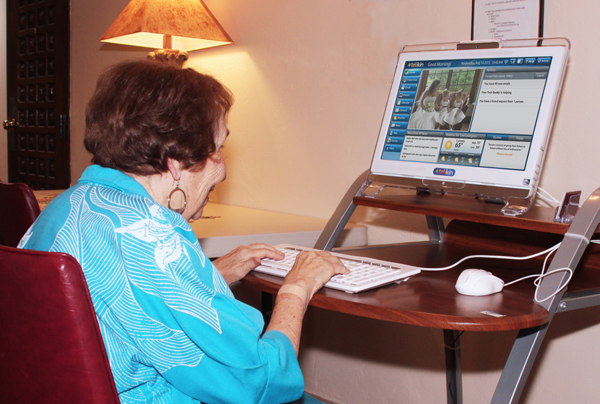Getting Grandma Online
Author: Lauren Allegrezza
Though internet use among adults 65+ is higher than its ever been, at 53% according to the most recent data from Pew Research Center, this percentage is still way far behind the rate of other age demographics. Ms. Span notes that the older adults demographic is the one that can benefit the most from having internet access, and yet, they are the slowest to adopt!
Technical Support
One of the points about how to accomplish this that Ms. Span brings up is about technical support.
Proper technical support, either from family members or an outside agent, is necessary for many older adults learning new technologies. From reading the comments on the article, it seems like everyone has a story to share about trying to teach their mother/grandfather/aunt/great uncle how to use a computer for the first time. This process can be very frustrating for both parties involved, especially if its over a distance. Proper support for those new to technology is hard to come by because most technical agents are trained to give support to the 25-35 year old demographic. Its not always a matter of the agent being respectful or kind, but it may be that the agent just doesnt understand how to explain certain concepts to a tech-novice. With a senior whos never even touched a computer before, walking them through how to set up a wireless internet connection takes a whole different approach than with someone in their 20s.
This is why at Telikin we look for qualities like patience, empathy, resourcefulness, and perceptiveness, as well as technical expertise, in our support agents. We also train them to use non-technical language and common metaphors to explain how functions like email or photosharing work. Remote access capabilities also help tremendously because it overcomes the language barrier between the tech agent and tech-novice user.
Tablets?
 Ms. Span also suggests tablets as an option for getting more older adults online quicker. Tablets often are considered as a good option for first time computer users, and certainly they have benefits, but they are not the answer for all, as I've written about before in, iPad for Seniors? For example, tablets still have to be configured, which is a complicated process for a computer novice. Additionally, because apps for tablets are all different, there is no consistent user interface, further extending the learning curve for a new user.
Ms. Span also suggests tablets as an option for getting more older adults online quicker. Tablets often are considered as a good option for first time computer users, and certainly they have benefits, but they are not the answer for all, as I've written about before in, iPad for Seniors? For example, tablets still have to be configured, which is a complicated process for a computer novice. Additionally, because apps for tablets are all different, there is no consistent user interface, further extending the learning curve for a new user.
Ms. Span concludes her article by saying this was only one idea, and that she would welcome others.
It seems as though there is this belief that if only we could get a laptop or tablet in the home of everyone over the age of 65 then well have cracked this digital divide!
But this line of thinking leaves out one big piece to the puzzle the technology itself.
What about Technology?
Heres my thought: Maybe part of the reason why older adults, on the whole, have taken so slowly to adopt computer technologies is because these technologies arent designed for them. Traditional computer technologies are complex and frustrating, even to many experienced users!
Sure, many people think that the iPad is easy to use. Those that do, however, also probably use a smartphone or other computer. Concepts and techniques that come naturally to those who are tech-savvy are actually not that natural. How do I get more options? Right-click on your mouse, of course! How do I rearrange these apps on the screen? Hold down on one until they all start wiggling and move them into place!
We've learned these skills over years of using all kinds of digital devices. Certainly, there are many people in their 60s, 70s, or even older, who are computer literate and have learned these skills. These seniors use smartphones, tablets, and computers. However, an even larger amount have never had the opportunity to learn technology, and therefore do not hold this niche skill-set. And of course, there are those who think computers are too complex and frustrating and only use them begrudgingly.
If we want more seniors to get online, then we must actually offer them something worthwhile to adopt. Thats why we developed Telikin. We took a step back to reevaluate what people, seniors and others, want most from a personal computer. Then we took those functions and presented them in an easy to navigate interface built on a protected and safe system and using state of the art, touchscreen capability, all helping to remove the barriers to computing.
If we really want to get more seniors online and using computers, we cannot overlook the importance of the device technology.
What are your thoughts? Leave me a comment below and share this article using the buttons at the top of the page!
Read the full article, Online Habits Coming Slowly to Older Adults, by Ms. Span.